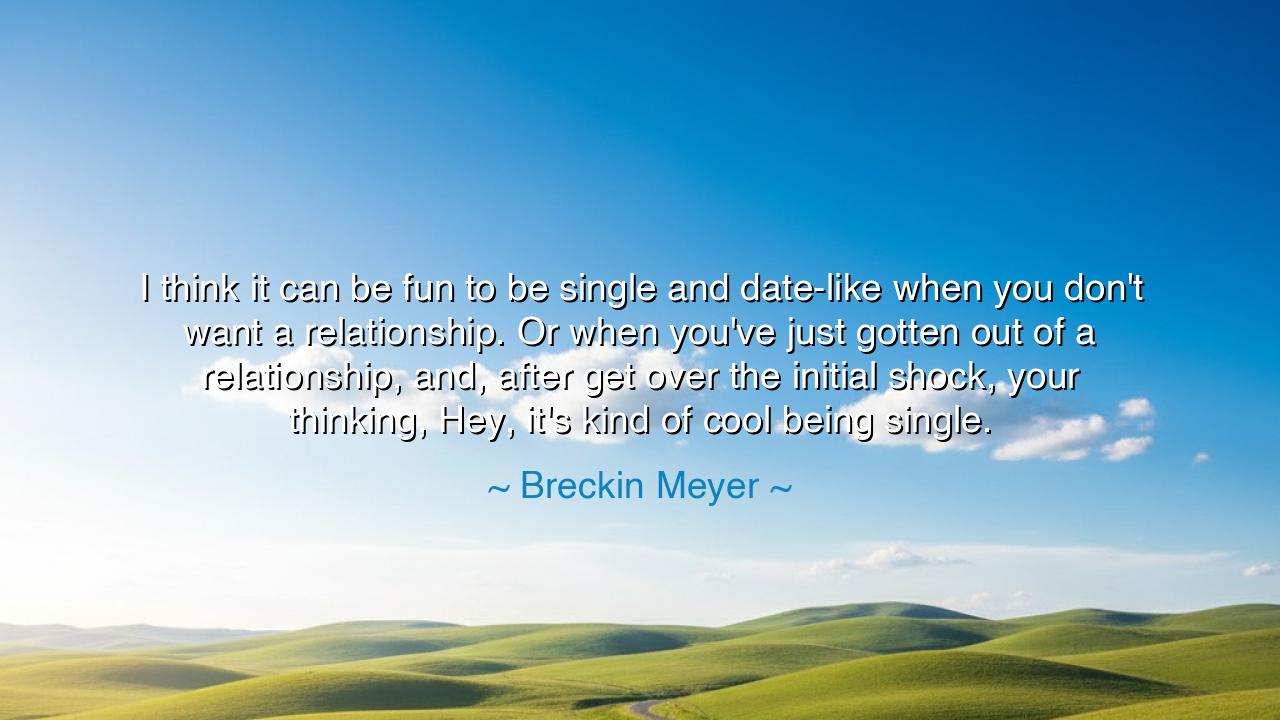
I think it can be fun to be single and date-like when you don't
I think it can be fun to be single and date-like when you don't want a relationship. Or when you've just gotten out of a relationship, and, after get over the initial shock, your thinking, Hey, it's kind of cool being single.






The actor Breckin Meyer, known for his wit and quiet introspection, once said: “I think it can be fun to be single and date-like when you don’t want a relationship. Or when you’ve just gotten out of a relationship, and, after you get over the initial shock, you’re thinking, hey, it’s kind of cool being single.” Though spoken casually, his words contain a truth that echoes through the ages — a truth about freedom, renewal, and the sacred art of rediscovering the self. For in every ending, there is not merely loss, but the seed of rebirth. The one who learns to walk alone for a time does not suffer isolation but gains clarity. Meyer’s reflection invites us to see singleness not as emptiness, but as opportunity — a moment to breathe, to reflect, and to begin anew.
In the ancient spirit of wisdom, one might say that Meyer’s words speak to the natural cycles of life: union and solitude, connection and retreat. To be single is not to be incomplete, but to stand within oneself with balance and awareness. After a great bond is broken, the heart trembles, for it has lost the rhythm of shared life. Yet, as the days pass, the soul rediscovers its own melody. The “initial shock” that Meyer describes is like winter after harvest — a time of stillness, when the world seems cold and bare. But from that stillness arises spring — the slow, steady return of joy in one’s own company.
The origin of this insight lies in one of the oldest lessons of humanity: that solitude is not the enemy of happiness but its teacher. The ancients knew this well. The philosopher Diogenes, who lived in simplicity and scorned the trappings of attachment, taught that the free man is the one who is content within himself. He walked through Athens with only a lamp, saying he searched for an honest man — yet what he sought was a soul unbound by need or pretense. In this, we see Meyer’s sentiment mirrored in ancient form: that to enjoy being single is to have discovered the quiet power of self-sufficiency.
To be “date-like,” as Meyer puts it, is not to live carelessly but to explore with curiosity, to engage in the dance of life without the chains of expectation. In ancient times, this was the way of the wanderer or the scholar who, freed from duty, journeyed to learn more about the world and himself. It is the period when one tastes the sweetness of possibility — when each encounter, each new experience, becomes a mirror showing what one desires and what one does not. To walk through such a season wisely is to learn the subtle balance between openness and restraint, between joy and discernment.
Yet Meyer’s reflection carries more than celebration; it also carries a gentle warning. For the “fun” of being single is not found in excess or distraction but in awareness. Those who flee from pain into endless pleasure do not heal — they only postpone their awakening. The freedom he speaks of is the freedom of renewal, not escape. The ancients would say: “Know thyself.” And indeed, the period of solitude after love is the time for this knowing — a sacred pause to ask, Who am I, when I am not defined by another? Only when one can answer that question with peace does one truly find the “coolness” Meyer describes — the serenity of standing whole within one’s own spirit.
There is a tale from Japan of a samurai who, after years of battle, laid down his sword and retired to a small garden. There, he tended the earth, watched the seasons pass, and spoke with no one. When asked years later why he abandoned the glory of combat, he said, “I wished to learn whether I could still live without war.” His time alone was not a rejection of life but a rediscovery of balance. So too is the period of being single after a relationship — it is not withdrawal, but recalibration, the act of regaining peace before taking up the next journey.
The lesson, then, is this: embrace solitude as a sacred teacher. Do not fear the moments when life strips you of companionship, for they are the moments when the soul grows roots again. Use the time of singleness to explore not only others but yourself — to rekindle your passions, rediscover your voice, and rebuild your inner home. Learn to walk joyfully in your own presence, so that when love returns, it will not fill a void but join a fullness.
Thus, Breckin Meyer’s words, though light in tone, carry the depth of ancient truth: that being single is not a curse, but a chapter of freedom and growth. Like the traveler resting between journeys, you stand at the threshold of rediscovery. Do not rush to fill the silence; let it teach you. For when the heart learns to be content in its own company, every future bond becomes a choice, not a need — and in that choice lies the purest form of love.






AAdministratorAdministrator
Welcome, honored guests. Please leave a comment, we will respond soon